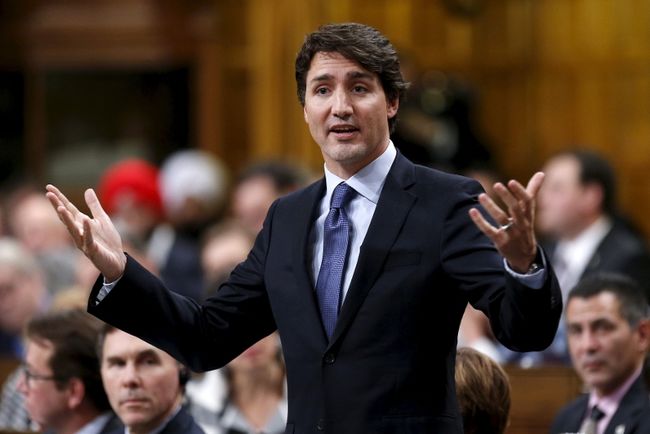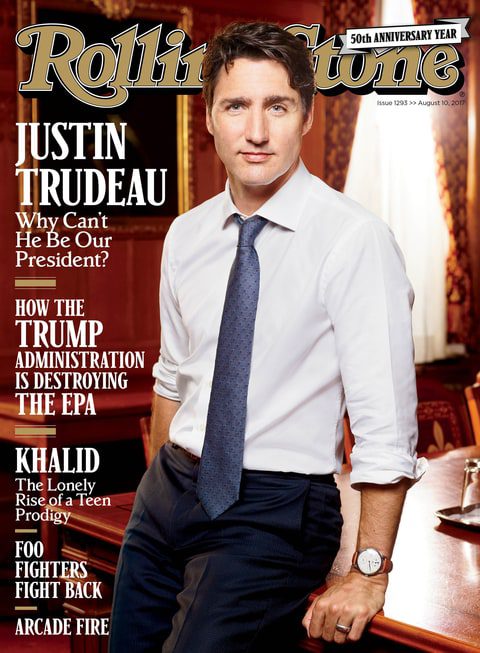In the 2015 campaign, the Liberals promised a great many things when it came to restoring the oversight of taxpayer dollars to Parliament after the Harper government weakened it, particularly when it comes to government borrowing. And in their budget implementation bills, it actually seemed like this was a promise that they had actually kept. As it turns out, they weaselled out of actually fulfilling that promise in the fine print of the bill. So last week, Liberal Senate Leader Joseph Day introduced a bill that seeks to fix the problem once and for all, and that will force the government to live up to that promise.
First, a little background. From the very origins of our parliamentary system with the Magna Carta in 1215, King John agreed that his government could not raise revenues through taxation without the consent of Parliament. Since at least 1688, the King and his government couldn't borrow any funds without Parliament's consent. As the system evolved in Canada, government borrowing was part of the Supply and Estimates process, and the borrowing was debated at the same time as the authority to spend the money that was being requested.
This was the case until 1975, when changes to the Supply and Estimates process were brought in to ostensibly deal with the increasing complexity of government finances (but in reality allowed government to steamroll through the Estimates with the "deemed" rule), but the compromise was that when a government ran a deficit, they needed to introduce a separate "borrowing bill" in Parliament in order to request permission to borrow a specified amount of money. This became enshrined into section 43 of the Financial Administration Act, which stated that "no money shall be borrowed by or on behalf of Her Majesty…except as provided by or under…(an) Act of Parliament…" And that meant at least one borrowing bill every year that allowed Parliament to scrutinize and debate the government's debt-management strategy, and to do what Parliament's ultimate purpose is to hold the government to account by means of controlling its supply of money.
This changed in 2007, when Stephen Harper's Conservative government slipped a tiny clause into the middle of a very large omnibus budget bill that amended the Financial Administration Act. The new wording: Section 43.1 stating that "The Governor in Council may authorize the Minister to borrow money on behalf of Her Majesty in right of Canada." In other words, Cabinet could take it upon itself to borrow any money it wanted without parliamentary scrutiny or oversight, and without a bill to authorize it. Because why should Parliament matter?
The House of Commons didn't notice this change, but the Senate did only after the bill had already passed. In the years since, Progressive Conservative Senator Lowell Murray and Liberal Senator Wilfred Moore introduced bills to delete that clause and restore borrowing authority to Parliament, where it belongs. And the Liberals in the House of Commons at the time were in support of this Ralph Goodale was signed on to be the sponsor of Moore's latest bill, which had the added heft of his being a former finance minister.
Fast-forward to 2015 and the general election. In their campaign platform, under the heading of "Greater oversight of taxpayer dollars," the Liberal promise was this: "restoring the requirement ended by Stephen Harper that the government's borrowing plans receive Parliament's pre-approval." And it sounded great, like they had listened to the concerns that Liberal senators had raised for the past several years.
But when the first 2017 budget implementation bill came to pass, their legislation was a little less than what was promised. Rather than just doing the easiest thing, which was to delete that Conservative clause and restore borrowing authority to Parliament, the Liberals instead said that they would only need to go back to Parliament if the amount being borrowed would make the federal debt exceed $1.168 trillion. Oh, and Cabinet only had to report back to Parliament about the money it has borrowed every three years starting in 2020 beyond the next scheduled general election.
In other words, the Liberal government weaselled out of their own promise, and gave themselves the out to keep borrowing without Parliament approving it so long as it was below that total debt threshold. Senator Day estimates that it means that there is room for the government to borrow as much as $100 billion without any Parliamentary approval or oversight, nor does it have to report on its debt-management strategy.
Now, I get that the Liberals are a bit sensitive about the deficit after they decided to abandon their temporary-deficits-for-three-years promise (and not without reason, considering that there was about $70 billion in GDP missing from the Conservatives' Budget 2015 plans and the 2016 reality, which much of that additional spending that the Liberals made). And I get that they've shifted their deficit anchor from a fully balanced budget target to one of a declining debt-to-GDP ratio (perhaps because the Conservatives' balanced budget was a paper exercise that was not truly balanced, and which booked a bunch of fictional savings like the Phoenix pay system, and the gong show known as Shared Services Canada). But just because they don't want to have an uncomfortable discussion about those deficits doesn't mean that they should renege on their actual, clear promise to restore parliamentary borrowing authority.
Parliament's role in holding the government to account matters, and it especially matters when it comes to the public purse. For too long, we have let those responsibilities slide in the name of expediency, which is why our Estimates cycle has become a pro forma exercise that doesn't serve accountability. That MPs let the successive governments get away with changing the Public Accounts so that they don't match the Estimates was nothing less than a dereliction of duty. And for the Harper government to do away with borrowing authority was a cynical undermining of our very parliamentary system. The Liberals have thus far talked a good game about reforming the Estimates to be more transparent, and I will give them props for releasing a budget in advance of the Estimates this year so that they can actually match up for the first time in decades. But their weaselling out of their promise on borrowing authority needs to be called out and fixed, and good on Senator Day for taking them to task on this. Hopefully the rest of Parliament sees the light and passes his bill.








